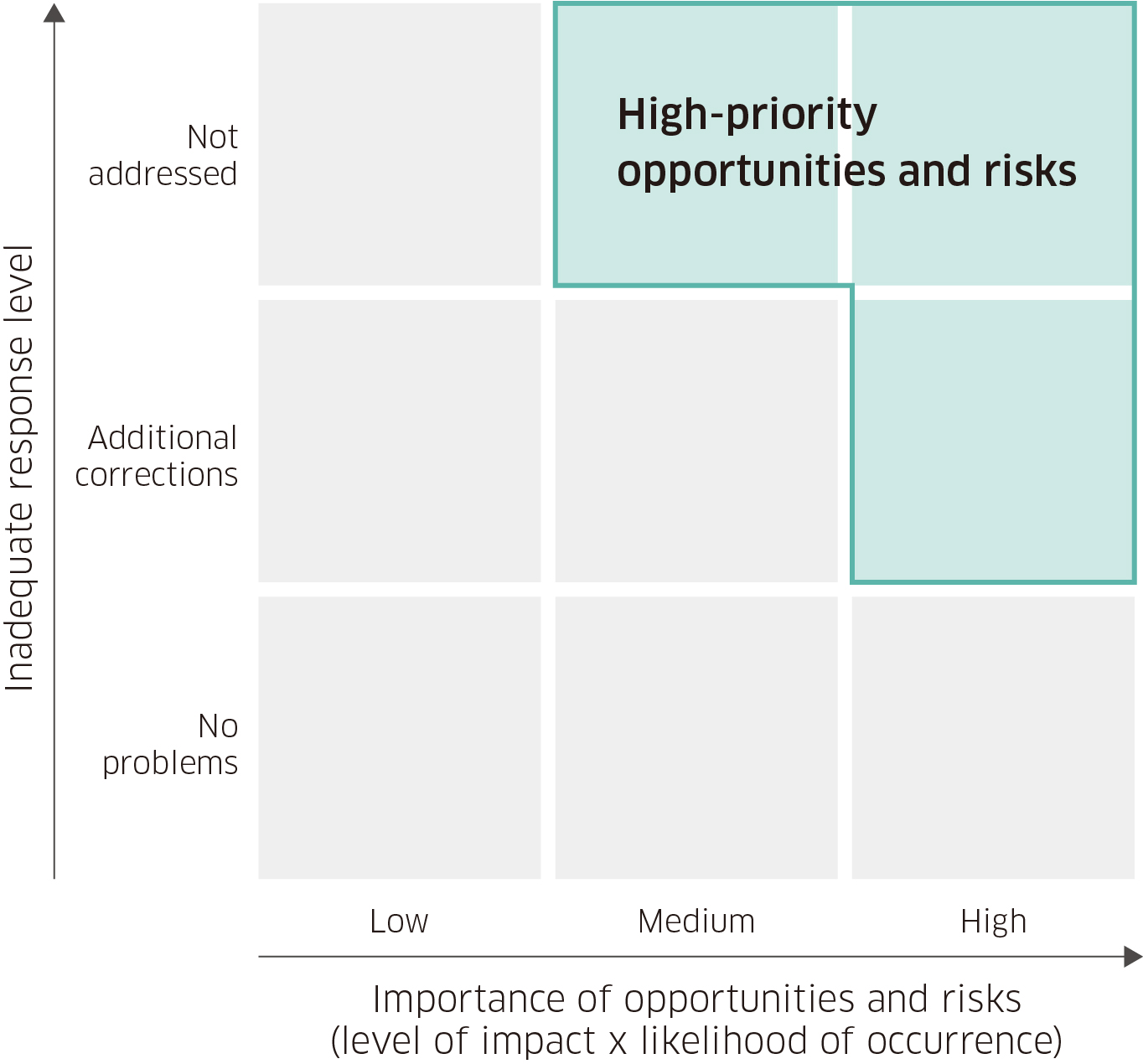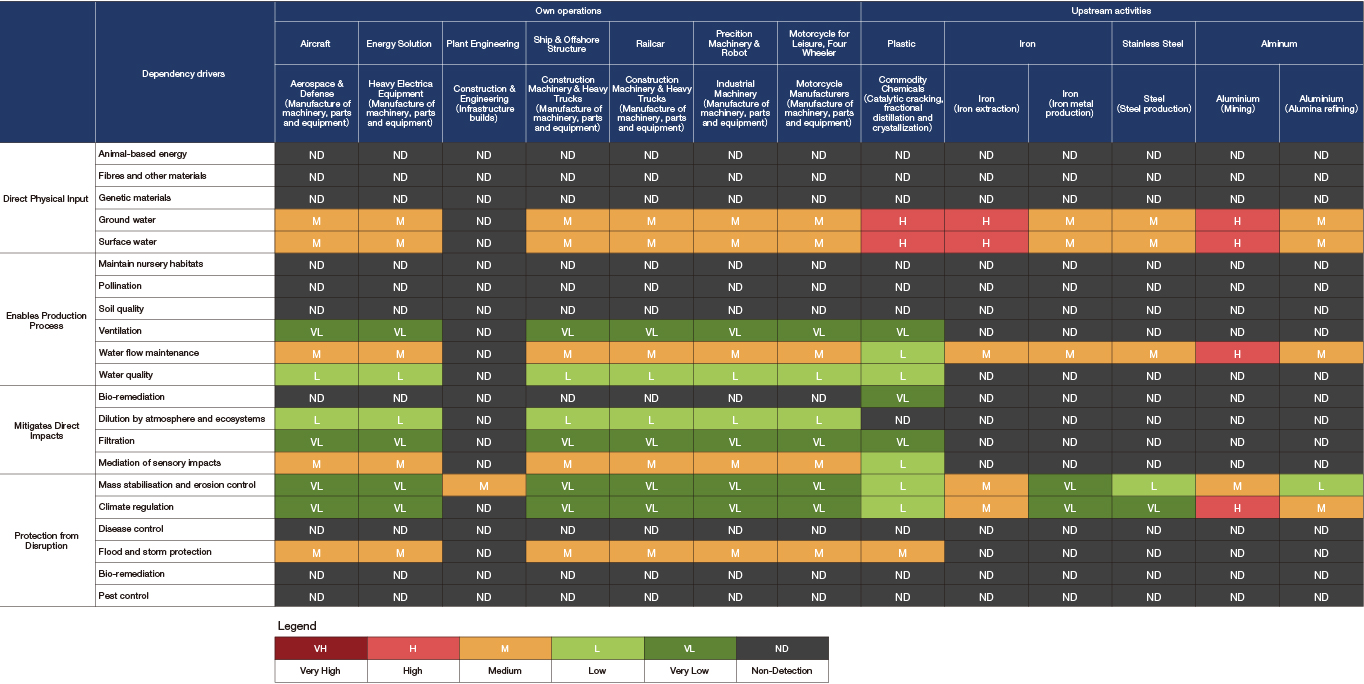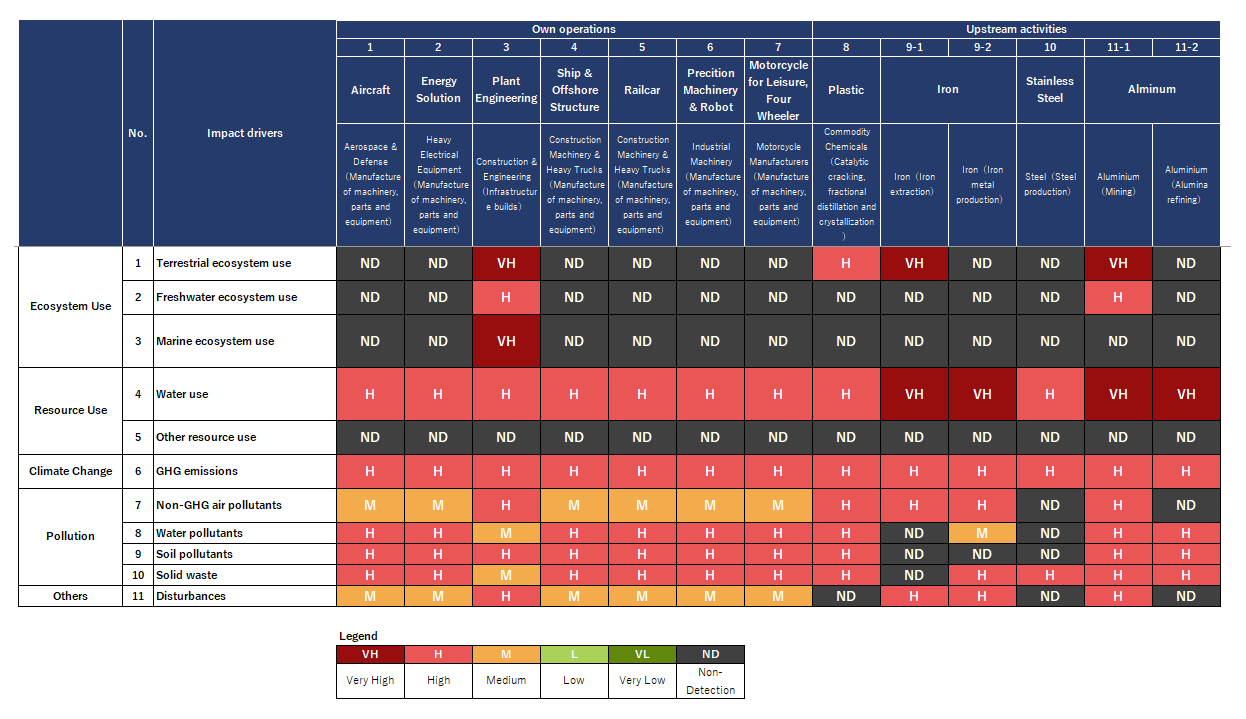Harm FREE (Realization of a Society Coexisting with Nature)
- Basic Stance
- The Environmental Management Activities Plan (Harm FREE)
- Policy on Biodiversity
- Measures to Protect Biodiversity
- Harmful Chemical Substance Reduction
Our Basic Stance
Modern society is maintained by the value provided by natural ecosystems, including material cycles and the regeneration of air, water, and soil environments. However, ecosystem services are deteriorating globally, and the World Economic Forum's Global Risk Report 2025 lists biodiversity loss and ecosystem collapse as the second-most serious risk after extreme weather events among the most serious risks over the next decade. Kawasaki Group reduces the environmental impacts of its products and business activities and contributes to the protection of ecosystems. In addition, we will strive to prevent pollution of the global environment by properly managing hazardous chemicals and reducing the amount used.
The Environmental Management Activities Plan (Harm FREE)
The Environmental Management Activities Plan 2024 (Key Strategies) and Achievements in Fiscal 2024
| Key Strategies of the Environmental Plan 2024 | Achievements in Fiscal 2024 |
|---|---|
| (a) Protecting biodiversity (responses to TNFD) | |
|
|
| (b) Enhancing data compilation and capacity to disseminate information | |
|
|
The Environmental Management Activities Plan 2025 (Key Strategies)
| Key Strategies of the Environmental Plan 2025 |
|---|
(a) Protecting biodiversity (responses to TNFD)
|
(b) Enhancing data compilation and capacity to disseminate information
|
Policy on Biodiversity
The Kawasaki Group enacted a new biodiversity policy in June 2025. This was to reaffirm our awareness of the impact that we have on biodiversity in our Group’s business activities and value chain, and to display our intention to engage with the social issues of maintaining and recovering biodiversity. Under this policy, based on the mitigation hierarchy concept we will formulate and implement coping measures based on the sequence of avoidance, minimization, rehabilitation, and offsets as we endeavor to reduce our environmental load, while also aiming, through new technological development, to provide solutions toward the maintenance and recovery of biodiversity. Additionally, in keeping with Japan's National Biodiversity Strategy and Action Plan (NBSAP) of Japan 2023-2030 decided by the Cabinet on March 31, 2023, we are pushing forward with initiatives aimed at realizing "Nature-Positive by 2030."
Measures to Protect Biodiversity
Disclosure in Line with the Recommendations of the Task Force on Nature-related Financial Disclosures
As indicated in the Kawasaki Group Policy on Environmental Management, the Group conducts business activities that respect biodiversity as it promotes environmental protection. In this section, we report on our dependence and impact on biodiversity and natural capital by advancing analyses based on the TNFD recommendations and the LEAP approach, an analysis consisting of four steps: Locate, Evaluate, Assess, and Prepare.
Evaluate (Evaluate Your Dependencies and Impacts on Nature)
In the Evaluate phase, we conducted a macro-level impact assessment across sectors that include our Group’s businesses (such as aircraft and energy equipment). Using ENCORE, a tool for understanding the scale of dependencies and impacts on nature, we then performed a risk evaluation. Additionally, for upstream supply chains, we conducted risk assessments using similar sectors. As a result, we identified four high-risk items related to dependencies, as well as ten high-risk items related to impacts. Our Group uses significant amounts of mineral resources such as iron and aluminum as raw materials, making greenhouse gas emissions and water resource usage during mining and refining critical concerns. Based on these findings, we have determined that while some of our Group’s activities, such as those in the plant business, may have a direct impact on biodiversity, the majority of our activities impact biodiversity indirectly through greenhouse gas emissions and water resource usage.
Risk assessment of the Group’s business activities and the dependency on the impact on nature
Risk assessment of the Group’s business activities and the relationships of the impact on nature
Locate (Locate Your Interface with Nature)
In the Evaluate phase, we analyzed macro-level impacts in each sector, but in the Locate phase, we assess the impact on nature of geographical factors at operational sites. An impact assessment of our Group’s 26 domestic and 16 overseas production sites revealed that domestic sites have relatively low risk. In contrast, water-related risks in India, China, and Mexico, and biodiversity risks in Brazil, are comparatively higher.
Impact assessment at overseas production sites
| Assessment items | Number of sites with an impact |
Location of sites |
|---|---|---|
| Importance of biodiversity | 3 | South America, Asia, Europe |
| Ecosystem integrity | 1 | South America |
| Rate of tree loss | 2 | South America, Asia, Europe |
| Water availability | 9 | North America, Asia |
| Water pollution | 12 | North America, Asia, Europe |
Assess (Assess Your Nature-related Risks and Opportunities)
Based on the results from Evaluate and Locate, in the Assess phase, we analyze opportunities and risks, focusing on relatively high-risk businesses and sites within the Group. Incorporating TNFD examples, we identified potential opportunities and risks related to water, soil, waste, and other factors. These were assessed along two axes: importance and level of inadequate response. For overseas sites, water was determined to represent both an opportunity and a risk. In addition, anticipating promotion of resource circulation, demand for resource sorting was identified as an opportunity.
Opportunity and risk assessment

Results of opportunity/ risk assessment
| Production sites | Opportunities | Risks |
|---|---|---|
| India, China, others |
|
|
Prepare (Prepare to Respond and Report)
In the Prepare phase, we are advancing the following responses. To address water resource scarcity, we are promoting water conservation and recycling during the manufacturing process. In addition, with products such as the MAG Turbo and Mega MAG Turbo aeration pumps for wastewater treatment, we aim to contribute to addressing global water issues and realize sustainable wastewater treatment plants. Regarding resource sorting, through solutions such as K-Repros, an AI-equipped resource sorting support system utilizing collaborative robots, we are advancing resource circulation while also addressing social challenges, such as reducing the burden on workers.
Harmful Chemical Substance Reduction
Kawasaki Heavy Industries, Kawasaki Railcar Manufacturing, and Kawasaki Motors properly manage and look for alternatives to chemical substances that present a risk of negatively impacting human health or the environment. We continuously monitor emissions of hazardous chemical substances, major VOCs (toluene, xylene, and ethylbenzene), and handling volumes of dichloromethane and hazardous metals (hexavalent chromium compounds) handled, conduct appropriate chemical substance management, take action to reduce usage, and strive to prevent pollution of the global environment. In fiscal 2023, the use of hexavalent chromium and major VOCs increased from the previous fiscal year, but the use of dichloromethane decreased. In fiscal 2024, usage of dichloromethane and hexavalent chromium increased, while usage of major VOCs decreased year-on-year.
Contact
If you need more information about our business,
please feel free to contact us.







